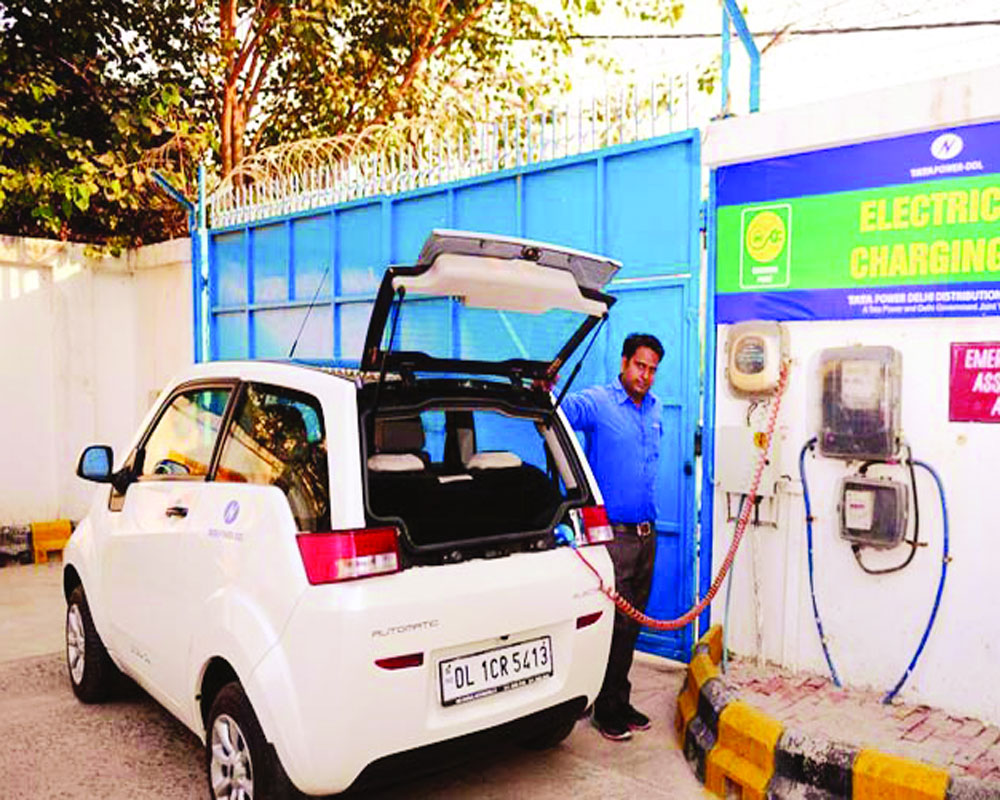The Government wants to promote electric mobility from a pollution perspective. That’s good but how does it propose to pay for it?
You will be surprised to hear that India is well on its way to become a surplus producer of electricity. In fact, even as tens of power plants, built during a debt-fuelled rush, are still to hit the grid, India has more than enough total electricity to meet most of its needs. The problem in our country that any expert on energy will tell you is the abysmal state of the finances of distribution companies that are usually owned by State Governments.
Politicians are used to giving doles of free power, which in some cases, benefit them the most as many leaders make it up to the ranks. India’s large and rich farmers have made matters worse. At the same time, some newer power plants produce energy at slightly higher rates and the urge to keep rates low or subsidised means that politicians would rather deal with load-shedding, which is not a function of power production anymore but one of cost.
We make this argument to answer those critics of electric cars, who ask where is the electricity for electric cars and two-wheelers if India is to go down the electric mobility route? The fact is that there is more than enough electricity in our country. If India were to go down an electric path and if one assumed that by 2030, 10 per cent of all new vehicles sold were electric, it would use under 10 per cent of the installed capacity. Of course, there are all sorts of other problems. We need to address them all.
The first, of course, is the fact that Battery Electric Vehicles are not exactly clean. They are, in the words of many, “emissions elsewhere” vehicles. This is particularly true in India where a bulk of power remains driven by coal-powered thermal plants. Thermal plants in our country use coal, which has high ash content. This makes the particulate matter problem even worse.
Of course, those living in Delhi won’t care if pollution moves away to a sparsely populated area, say 500 kilometers away, but until a compensatory scheme is worked out, it is not what you would call it to be ‘fair’. Also, according to some carbon mathematics done by both research institutes and car companies, this would make Battery Electric Vehicles more carbon-inefficient than a Plug-In Hybrid Electric Vehicle (PHEV).
Sure, one could argue that electric cars can be powered by green sources of energy, and that is a noble idea, but if you are charging your electric car at night, solar is not quite an option for obvious reasons. On the other hand, wind power is seasonal and needs vast open areas to build the turbines. In countries like Norway, where electric cars have really caught on, a majority of the power produced comes from hydroelectric plants, ironic for a nation that makes its money from selling oil.
Damming the Himalayas is fraught with seismic risks and large electricity generating dams on the plains like the Sardar Sarovar project have huge issues surrounding land acquisition. This is not to say that storage solutions to store solar energy generated in the day will not be available, some companies like Tesla are developing both home and commercial storage facilities for solar power. This could mean that solar power can charge your car and even meet the ‘peak’ demand for power, which in India is usually a Friday evening at 7 PM.
The problem is actually not so much about electricity generation but primarily one of storage and distribution. In fact, even in localities, where there is no problem of electricity supply, improvements need to be made to transformers and charging infrastructure if widespread electric private mobility takes off. And that will cost a lot.
Then there will also arise the question as to who will pay the electricity bill? This is the big problem in India — the bill. Further, there are unintended consequences as well, both Central and State Governments make huge amounts of money from taxing liquids. The liquids in question being alcohol and petroleum products. Here is the strange situation about subsidising electric cars and electricity for electric cars. More owners of electric cars and two-wheelers, who pay lower taxes and then don’t buy highly taxed petroleum, actually hurt Government revenues.
Of course, if that is the price to pay for lower emissions, some might argue that it is a price worth paying. But the overall benefit from battery-powered vehicles is questionable as we have already discussed, emissions move elsewhere and overall carbon benefits are lower than plug-in hybrids.
In fact, if one looks at battery-powered e-rickshaws, India has already adapted to electric vehicles but unintended consequences here have meant that millions of lead-acid batteries have to be processed and that has to be thought of. Cases of battery theft, too, have shot up in Delhi. This columnist has argued before that hybrid vehicles are the best thing to do in the short-term while charging infrastructure and the solutions for many of these problems are thought.
The Government has to think of ways to replace revenue while spending money on grid improvement. Subsidies for electric vehicles, particularly for cheap power, may be a self-defeating idea for Governments in the short term. Parking solutions have to be found. Where will people charge vehicles if they don’t have parking at their own house? Residential society bylaws have to be changed if people put chargers inside the parking areas and these will have to be thought of by policy-makers at the Centre, state and municipalities.
(The writer is Managing Editor, The Pioneer)


























